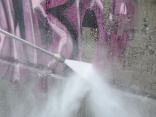Home › magazine › november 2020 › latest news › What’s new in high pressure cleaning?
What’s new in high-pressure cleaning?
5th of February 2021Digital displays, remote monitoring, an increased use of battery-powered machines, engines powered by compressed natural gas – these are just a few of the latest innovations in the high-pressure cleaning market. Ann Laffeaty asks manufacturers how the industry is evolving and discusses the impact of the Covid-19 pandemic on this sector.
High-pressure cleaning is generally considered to be a fairly low-tech option for removing dirt and grime from surfaces. An intense jet of hot or cold water – often employed without the addition of any chemicals – is hardly the most sophisticated of cleaning methods.
However, when used in conjunction with up-to-date equipment and the latest accessories, high-pressure cleaning can become a highly effective solution that can completely transform the appearance of building façades, driveways and other outdoor areas. And it is a cleaning method that ticks many boxes for today’s customers, according to Kärcher product manager Benjamin Weiss.
“High-pressure cleaning is a highly versatile solution that can swiftly adapt to social trends,” he said. “For example, the sustainability agenda has led to this cleaning method becoming increasingly popular because it can be used for cleaning solar and photovoltaic panels and for removing weeds from outside areas without the use of chemicals.”
It is the very simplicity of high-pressure cleaning that holds the attraction for some customers, according to Weiss. “In cases where it is used in just a small part of the business, customers tend to choose a straightforward, robust and price-attractive machine,” he said.
“However, other client groups are demanding more sophisticated products that incorporate elements such as automatic hose reels and electronics that offer machine protection. And they are placing a greater focus on ergonomics and comfort.” Kärcher’s EASY!Force trigger gun is an ergonomic solution designed to make high-pressure cleaning easier for the operator, according to Weiss.
The split between customers seeking sophisticated solutions and those who prefer to opt for simple ones is becoming increasingly marked, he adds. “We need to tailor our solutions to suit each customer group,” he said.
The trend towards daytime cleaning along with the current demand for higher standards of hygiene due to Covid-19 are both factors impacting on the high-pressure cleaning sector, he says.
“The increase in daytime cleaning has led to an increased sensitivity to noise and a requirement to make machines that perform as quietly as possible,” he said. “As a result, the use of combustion motors is becoming more difficult and there is a growing potential for replacing them with battery-powered machines.”
Demand for higher standards of hygiene was becoming evident in several countries even before the Covid-19 pandemic, according to Weiss. “This is now more important worldwide and we predict that the ability to disinfect surfaces will become a future requirement in certain target groups.”
Not standing still
Weiss claims Kärcher’s HD 4/11 C Bp model to be the first professional battery-driven high-pressure cleaner on the market. The company also offers the HD-MXA which now has an integrated automatic hose reel for cold water use.
While the high-pressure cleaning industry is not currently evolving at any great speed, it is certainly not standing still according to Dibo’s communications manager Kat Coppieters. “And for Dibo this evolution can mainly be seen within our hot water high-pressure trailer market,” she said.
Two new high-pressure trailers recently launched by Dibo will help to meet demand for sustainable cleaning solutions, she claims. The first is fitted with an electric motor and the second runs on compressed natural gas.
“Electric cleaning is the challenge for the future and we are working with a state-of-the-art battery management system for efficient charging, discharging and recharging for a longer battery life,” said Coppieters. “And a high-pressure trailer running on CNG is the most environmentally-friendly and lowest-cost trailer there is compared with other fuel engines.”
According to Coppieters, CNG engines emit considerably less particulate matter and nitrogen oxides than diesel engines while also reducing CO2 emissions and producing 50 per cent less noise. “And because of the cleaner combustion of CNG there is also less maintenance involved,” she adds.
Other Dibo innovations include a track and trace system that enables the operator to monitor the machine’s status via a computer or smartphone, and a digital display that provides ongoing information on parameters such as pressure, temperature, fuel level and water level.
The industry is changing in line with customer requirements, according to Coppieters. “The professional user is attaching increasing importance to user-friendliness, high quality and a long service life,” she says. “Customers also want sustainable solutions that can be used anywhere within cities and towns and are increasingly looking for environmentally-friendly cleaning methods.
“And they want innovative solutions that make full use of latest technologies.”
Unlike Coppieters, IPC’s senior product manager for high-pressure washers Antonio Bigaran believes the sector is developing rapidly. “Customers are looking for more flexibility in terms of performance and machine features,” he says. “Some machines are capable of handling very high pressures and flow rates while others can provide low flow rates and lower pressures where required.
“These types of machine are particularly suitable for specific applications in sectors such as food and mechanics where large volumes of water are not required and where high pressures could alter the calibrations of instruments.”
Like Kärcher’s Benjamin Weiss he feels the market is moving in two ways at the same time. “Thanks to new technology there are now increasing numbers of sophisticated electronic devices available that can customise and optimise the interface with the operator, providing useful information that can help them with their work,” he said.
Reliable tool
“However, while the development of technical features and electronic devices is always important, we must never forget that the machine should be a reliable tool that is easy to use.” For this reason, IPC’s range includes basic models as well as more complex machines featuring detectors and indicators that make cleaning a fully-monitored experience.
According to Bigaran, the sustainability agenda has had a significant impact on the high-pressure cleaning industry. “The market has become very sensitive to the energy issue and is looking at new energy solutions for heating water,” he said.
IPC’s Green Jet 7510 M multifunctional machine is designed for washing areas where hot water at a stable temperature of 100°C is required along with the mechanical action of water at high pressure. Other machines in the IPC range are the PW-H100 HTM, which is designed to maintain a constant water temperature of 100°C, and the WD- E and PW-E100 hot water machines with electric boilers.
Covid-19 has dominated the news for much of the year and has dramatically raised the profile of cleaning. But how has it impacted on the high-pressure cleaning sector?
The market has been performing well during the crisis, according to Kärcher’s Benjamin Weiss. “There is an increased awareness of cleaning around the world and we think the pandemic will speed up this process,” he said. “Demand for high-pressure cleaning equipment remains high compared with other sectors due to its versatility.”
He adds that a hot water high-pressure cleaner can achieve a measurable reduction in the numbers of germs. “Using the steam stage it is even possible to clean at temperatures of up to 155°C,” he said. “And when cleaning with high-pressure equipment, disinfection cleaners may be applied with the cup foam lance to interrupt infection chains and remove dirt residues.”
Dibo is not anticipating any significant growth in the high-pressure cleaning sector at present. “Governments are only focusing on combating Covid-19 and they don’t have the budget available for new investment,” said Kat Coppieters. “Premises cleaning is often postponed in the event of a crisis in any case. And around 10 per cent of our customers have now switched to chemical cleaning solutions.”
However, she adds that when used correctly, steam cleaning can combat viruses such as Covid-19. “We can supply machines that have a steam function, but this is an expertise that must be carried out by specialists in the correct manner,” she said.
Buoyant market
IPC’s Antonio Bigaran feels that the effectiveness of high-pressure cleaning systems against viruses such as Covid-19 is a sensitive issue. “Pathogenic microorganisms such as viruses and bacteria need to be removed using complex and articulated techniques,” he explains. “But cleaning is the first, fundamental and necessary step towards their removal – and high-pressure washers are a powerful mechanical instrument that can carry out this first step, making cleaning activities effortless and effective.”
Bigaran believes the market to be buoyant, adding that the Covid-19 pandemic has led to an increased demand for high-pressure washers.
“This is because in some cases the action of chemical products is not enough and a mechanical action is required to remove dirt from surfaces,” he said. “As a result, high-pressure washers have become even more crucial in certain specific areas and for some applications and environments.
“And we believe that high-pressure machines will become a key tool in daily cleaning practices in the future - even in those areas where they have not generally been employed so far.”










